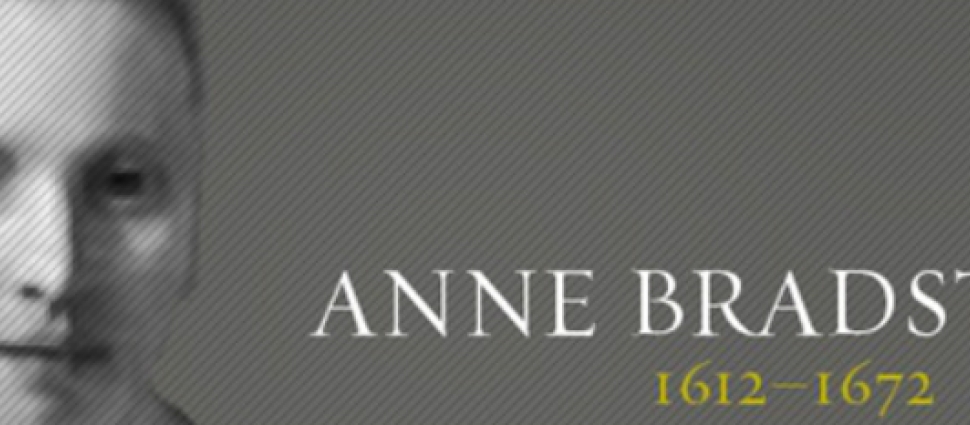Anne Bradstreet on Morality

May 8, 2017
“Many speak well, but few can do well.” Thus wrote Anne Bradstreet, America’s first poet and a witness to Puritan thought. In her “Meditations Divine and Moral,” she makes a statement that speaks to both the importance of personal morality to Puritans and a certain degree of ambiguity as to how that is achieved. “That house which is not often swept makes the cleanly inhabitant soon loath it, and that heart which is not continually purifying itself is no fit temple for the spirit of God to dwell in.”
Such a statement might have been written by John Owen, but the real question when examining the works of Anne Bradstreet is what she saw as the true source of her purification: personal effort or the working of the Spirit. The American Puritans are both famous and infamous for their moral code. Sometimes this was rooted strongly in Reformation thinking regarding grace, but sometimes it lapsed into a kind of simple moralism. So what did Anne Bradstreet mean when she spoke of the heart “purifying itself?”
In her poem “Of the Four Ages of Man,” Bradstreet makes clear her belief in the absolute corrupting power of the sinful nature. She has a child say, “Stained from birth with Adam’s sinful fact, / Thence I began to sin as soon as act.” A young man proclaims, “My lust doth hurry me to all that’s ill: / I know no law nor reason but my will,” and later continues, “Such wretch, such monster am I, but yet more, / I have no heart at all this to deplore, / Rememb’ring not the dreadful day of doom, / Nor yet that heavy reckoning soon to come.” Bradstreet herself noted that, “As I grew up to be about 14 or 15, I found my heart more carnal, and sitting loose from God, vanity and the follies of youth take hold of me.”
Bradstreet speaks of a God who is active in the world and terribly concerned with the deeds of individuals, constantly holding them to account.
“He that would keep a pure heart and lead a blameless life must set himself always in the awful presence of God. The consideration of His all-seeing eye will be a bridle to restrain from evil and spur to quicken on to good duties. We certainly dream of some remoteness betwixt God and us, or else we should not so often fail in our whole course of life as we do, but he that with David sets the Lord always in his sight will not sin against Him.” (“Meditations Divine and Moral”, #63)
In “Of the Four Ages of Man”, an old man concludes, “But what I have done well, that is my proper; / He that in youth is godly, wise, and sage, / Provides a staff then to support his age.” Taken together, this can give the impression of a judgmental God who must be constantly appeased through self-improvement efforts. Yet, if we look elsewhere in Bradstreet’s writings, we see that she did not subscribe to the notion that a human being could ever work their way into pleasing God. Rather, she held very much to the distinction between flesh and spirit, even writing a poem titled “The Flesh and the Spirit” in which these two figures speak to one another. At one point, the spirit says,
“Be still thou unregenerate part,Disturb no more my settled heart,For I have vowed (and so will do)Thee as a foe still to pursue.And combat with thee will and must,Until I see thee laid in th’ dust.Sisters we are, yea, twins we be,Yet deadly feud ‘twixt thee and me;For from one father are we not,Thou by old Adam wast begot,But my arise is from above,Whence my dear Father I do love.”
Elsewhere, she makes a very clear statement that behavior modification is not enough to achieve redemption.
“Men that have walked very extravagantly and at last bethink themselves of turning to God, the first thing which they eye is how to reform their ways rather than to beg forgiveness for their sins. Nature looks more at a compensation than at a pardon, but he that will not come for mercy without money and without price, but bring his filthy rages to barter for it, shall meet with miserable disappointment, going away empty bearing the reproach of his pride and folly.” (“Meditations Divine and Moral”, #66)
Thus, we must conclude that Anne Bradstreet believed that the pursuit of morality, while absolutely necessary, could only be accomplished under the power of the Spirit, and not by any innate goodness in human beings. In this, she was very much in line with the teachings of the Reformers and the leading Puritans in England.





